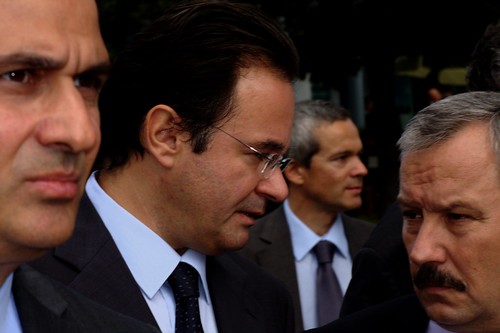On Thursday the European Statistical agency Eurostat will announce revised government debt figures for Greece in 2009. Despite being in power for over year the left of centre PASOK government headed by Giorgos Papandreou has still not been able to produce a clear idea of how much Athens actually owes.
Years of creative accountancy coupled with official incompetence means that no one is quite sure what the state has spent over the last decade. Today's Naftemporiki newspaper article lists measuresthat have been used to hide the true extent of debt load including the credit swaps organised by Goldman Sachs as well as other tricks such as delaying health service debts for years and the creation of "special funds" totalling billions of euros which were not included in budget figures.
On the other hand the heads of Greece's two largest parties are engaged in name calling in the run up to the November local elections with both prime minister Giogos Papandreou and head of the opposition New Democracy party, Antonis Samaras exchanging jibes over who is to blame for the current economic crisis.
On the one hand claims by Papandreou that he had no idea of the depth of the country's economic woes is proving hard to sell especially in light of claims by both former German finance minister, Peer Steinbrueck and Eurogroup leader, Jean Claude Juncker that he was perfectly aware of the scale of government debt before he took -power in 2009.
On the other hand Samaras who served as a cabinet minister in the New Democracy government is claiming that his party left the country in good economic shape and that it is PASOK mishandling of the economy which produced the current crisis. A claim also challenged by Juncker's claims that fellow European leaders warned Greece about the consequences of its debt load in 2008 but which then prime minister, Kostas Karamanlis chose to ignore.
What we have unfortunately is a political clash in which both sides are seemingly unwilling to accept blame for the dire state of the economy and who indulge in populist mudslinging.Despite the severity of the situation the election campaign seems to see the parties operating on a business as usual basis.The consistent pattern of lying and evasion is undermining what little credibility the Greek political system has in the eyes of many voters who give little credence to political party claims and counter claims.
The only thing most people are sure about is that their living standards are rapidly dropping with 92% of people in the greater Athens area saying they have reduced spending even on food. As the political elites argue over who is not to blame one in three young Greeks are unemployed and the country is looking at even harsher measures which will make this winter one of the most difficult in living memory.
Years of creative accountancy coupled with official incompetence means that no one is quite sure what the state has spent over the last decade. Today's Naftemporiki newspaper article lists measuresthat have been used to hide the true extent of debt load including the credit swaps organised by Goldman Sachs as well as other tricks such as delaying health service debts for years and the creation of "special funds" totalling billions of euros which were not included in budget figures.
On the other hand the heads of Greece's two largest parties are engaged in name calling in the run up to the November local elections with both prime minister Giogos Papandreou and head of the opposition New Democracy party, Antonis Samaras exchanging jibes over who is to blame for the current economic crisis.
On the one hand claims by Papandreou that he had no idea of the depth of the country's economic woes is proving hard to sell especially in light of claims by both former German finance minister, Peer Steinbrueck and Eurogroup leader, Jean Claude Juncker that he was perfectly aware of the scale of government debt before he took -power in 2009.
On the other hand Samaras who served as a cabinet minister in the New Democracy government is claiming that his party left the country in good economic shape and that it is PASOK mishandling of the economy which produced the current crisis. A claim also challenged by Juncker's claims that fellow European leaders warned Greece about the consequences of its debt load in 2008 but which then prime minister, Kostas Karamanlis chose to ignore.
What we have unfortunately is a political clash in which both sides are seemingly unwilling to accept blame for the dire state of the economy and who indulge in populist mudslinging.Despite the severity of the situation the election campaign seems to see the parties operating on a business as usual basis.The consistent pattern of lying and evasion is undermining what little credibility the Greek political system has in the eyes of many voters who give little credence to political party claims and counter claims.
The only thing most people are sure about is that their living standards are rapidly dropping with 92% of people in the greater Athens area saying they have reduced spending even on food. As the political elites argue over who is not to blame one in three young Greeks are unemployed and the country is looking at even harsher measures which will make this winter one of the most difficult in living memory.

No comments:
Post a Comment